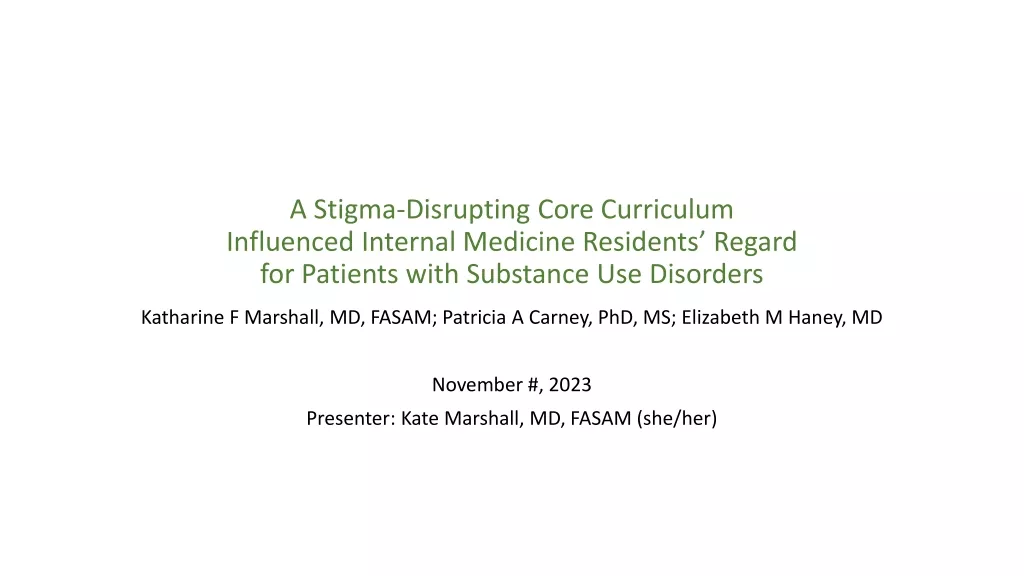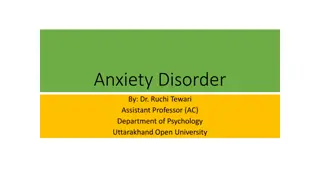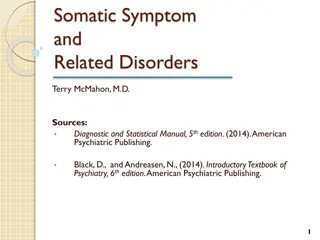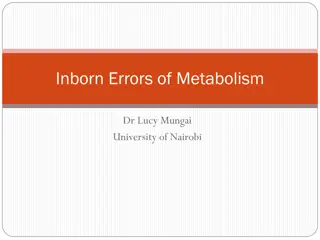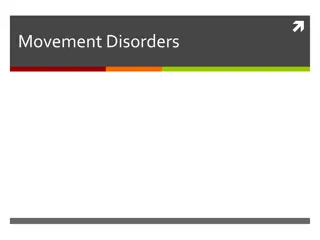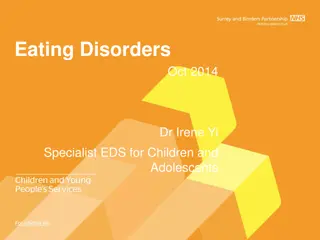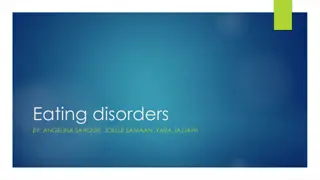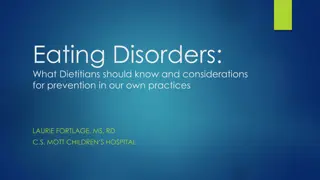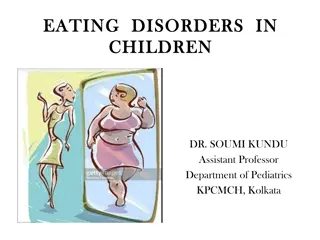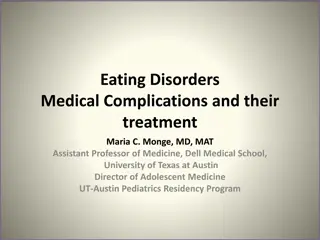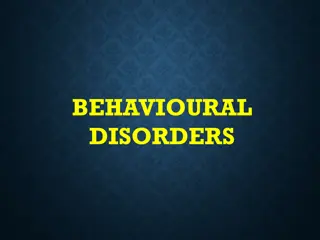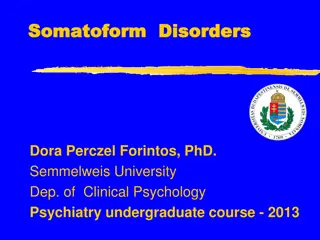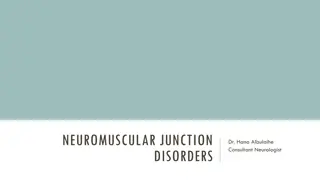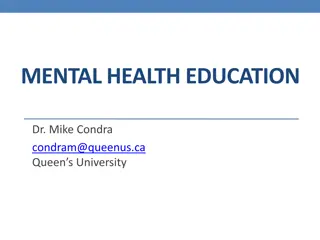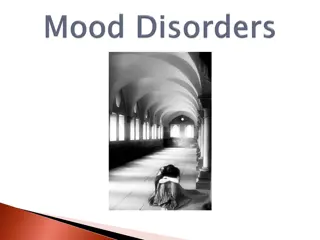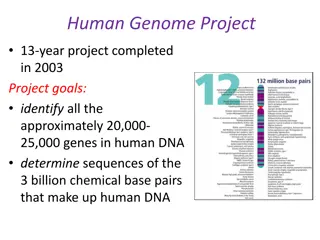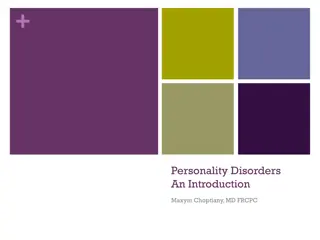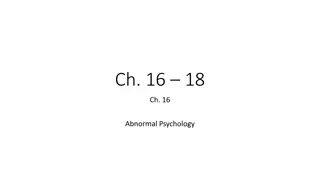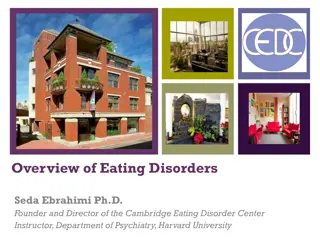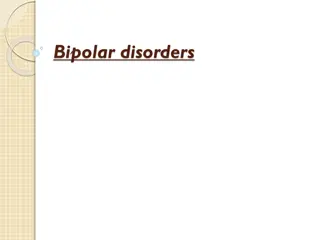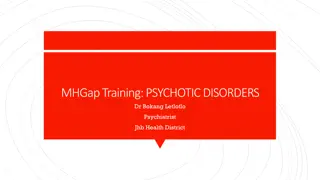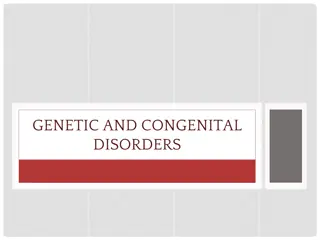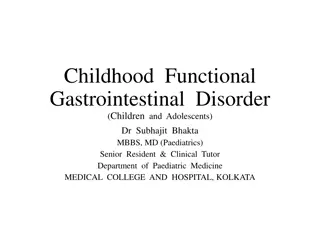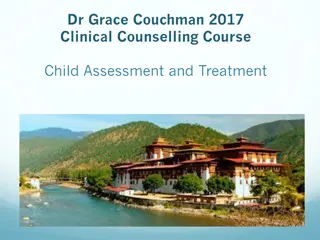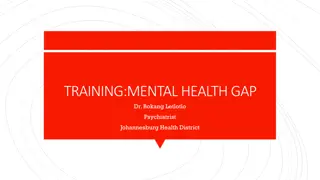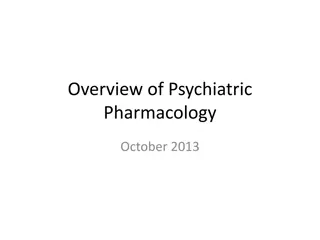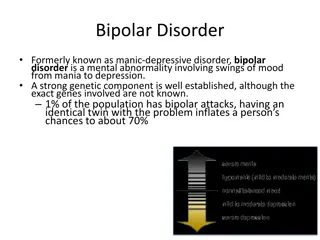Enhancing Internal Medicine Residents' Approach to Patients with Substance Use Disorders
This study focuses on developing and implementing a stigma-disrupting curriculum to improve internal medicine residents' attitudes and knowledge regarding patients with substance use disorders. By addressing provider stigma and enhancing preparedness, the aim is to promote positive regard and increa
1 views • 27 slides
Exploring Mental Health Categories and Disorders
In today's categories, we delve into themes like stigma, recovery, myths, and facts surrounding mental health. We discuss various disorders including psychotic disorders and observable signs like hallucinations, delusions, and flat affect. Discover the signs and symptoms of mood disorders and high/l
1 views • 71 slides
Overview of Human Genetic Disorders
Human genetic disorders encompass a range of conditions, from recessive disorders like cystic fibrosis to dominant disorders such as Huntington's disease. Examples include cystic fibrosis, Huntington's disease, and sickle-cell anemia. Understanding genetic disorders involves research and awareness o
0 views • 10 slides
Understanding Anxiety Disorders and Related Conditions
Explore the distinguishing features of anxiety disorders such as generalized anxiety disorder, panic disorder, and phobias, along with insights into obsessive-compulsive disorder (OCD) and posttraumatic stress disorder (PTSD). Delve into the impact of conditioning, cognition, and biology on these co
2 views • 46 slides
Overview of Anxiety and Related Disorders
Anxiety disorders, such as PTSD, panic disorders, phobias, agoraphobia, and OCD, are characterized by varying degrees of fear and distress. Anxiety is a normal response to danger, but when it becomes chronic, it can lead to debilitating conditions. PTSD occurs post-trauma, panic disorders involve in
1 views • 42 slides
Understanding Anxiety Disorders: Causes, Symptoms, and Types
Anxiety disorders are a group of mental illnesses characterized by excessive and overwhelming anxiety and fear. This article explains the normal emotion of anxiety, symptoms of anxiety disorders, types of anxiety disorders, and common causes like genetics, brain chemistry, environmental stress, and
1 views • 8 slides
Understanding Somatic Symptom Disorders, Conversion Disorders, and Dissociative Disorders
Somatic symptom disorders manifest as physical symptoms without apparent cause, while conversion disorders involve specific physical symptoms incompatible with medical conditions. Illness anxiety disorder involves interpreting normal sensations as disease symptoms. Dissociative disorders lead to a s
1 views • 41 slides
Understanding Somatic Symptom and Related Disorders
Exploring the key features, diagnostic criteria, contributing factors, and management principles of Somatic Symptom and Related Disorders. This comprehensive guide covers the clinical manifestations, co-morbidities, and treatment approaches associated with these disorders, shedding light on somatic
2 views • 38 slides
Understanding Inborn Errors of Metabolism and Metabolic Disorders
Inborn Errors of Metabolism (IEM) are genetic disorders that disrupt metabolic pathways, leading to substrate accumulation or product deficiency. These disorders can be classified based on toxic accumulation, protein metabolism, carbohydrate intolerance, lysosomal storage issues, energy production d
0 views • 29 slides
Understanding Movement Disorders and Parkinson's Disease
Movement disorders encompass a range of conditions like myoclonus, chorea, hyperkinetic tremor, dystonia, and more. Definitions of terms like bradykinesia, rigidity, and parkinsonism help in understanding these disorders better. Parkinson's disease, a common condition associated with parkinsonism, i
0 views • 15 slides
Understanding Co-occurring Mental and Physical Health Conditions
Co-occurring mental and physical health disorders are prevalent and require an integrative multidisciplinary approach for effective assessment and treatment. This holistic approach helps address the complexity of managing multiple disorders in an integrated healthcare setting. Through a multi-direct
1 views • 37 slides
Understanding Speech and Language Disorders
Speech and language disorders can impact an individual's communication abilities, affecting speech production, understanding, reading, and writing. These disorders may arise from conditions like brain developmental issues, strokes, traumatic brain injuries, or tumors. Treatment can offer significant
2 views • 17 slides
Understanding Functional GI Disorders: A Comprehensive Overview
Functional GI disorders encompass a range of conditions affecting the gastrointestinal system, such as irritable bowel syndrome and disorders of the gut-brain interaction. These disorders are characterized by no structural abnormalities but are influenced by factors like motility disturbance, viscer
0 views • 42 slides
Understanding Genetic Disorders and Their Impact on Health
Genetic disorders are caused by abnormalities in genes or chromosomes, leading to various health conditions. Inherited disorders can be passed down from parents to children, affecting physical makeup and processes in the body. In India, there is a high prevalence of genetic disorders, particularly i
1 views • 12 slides
Understanding Eating Disorders: Types, Signs, Effects, and Recovery
Eating disorders are mental disorders characterized by unhealthy eating habits and can have severe physical and psychological consequences. This article explores the definition of eating disorders, signs to look out for, different types such as Anorexia Nervosa, Bulimia Nervosa, Pica, and Purging Di
0 views • 10 slides
Understanding Eating Disorders in Children and Adolescents: Insights from Dr. Irene Yi
This comprehensive presentation by Dr. Irene Yi delves into eating disorders, including Anorexia Nervosa and Bulimia, in children and adolescents. The content covers types of eating disorders, developmental perspectives, assessment stages, and management strategies. NICE guidelines for managing eati
0 views • 25 slides
Understanding Eating Disorders: Types, Signs, and Recovery
Eating disorders are mental disorders characterized by unusual eating habits that can negatively impact physical and mental health. They manifest in various forms such as anorexia nervosa, bulimia nervosa, pica, and purging disorder. Recognizing signs like changes in weight, body image obsession, an
0 views • 6 slides
Understanding Eating Disorders: Insights for Dietitians
Eating disorders are complex neurobiological conditions that are not merely about control or weight management. These disorders can affect individuals of all genders, body sizes, and socioeconomic backgrounds. Dietitians play a crucial role in identifying, assessing, and treating eating disorders, a
0 views • 41 slides
Understanding Eating Disorders in Children by Dr. Soumi Kundu
Eating disorders in children, such as anorexia nervosa, bulimia nervosa, and binge eating disorder, are complex biopsychosocial disorders characterized by dysfunctional patterns of cognition and weight control behaviors. They result in significant physical, psychological, and social complications. T
0 views • 34 slides
Understanding Eating Disorders: Medical Complications and Treatment
This presentation by Dr. Maria C. Monge covers the common eating disorders in teenage patients, potential medical complications, and the role of the medical team in treatment. It includes definitions of disorders like Anorexia Nervosa, Bulimia Nervosa, and Binge Eating Disorder according to DSM-5 cr
0 views • 60 slides
Understanding Behavioral Disorders in Children
Behavioral disorders in children can result from various factors like emotional, physical, and social deprivation. These disorders manifest through a range of behaviors such as temper tantrums, bed-wetting, and aggressiveness. Identifying the causes and types of behavioral disorders is essential for
0 views • 49 slides
Understanding Somatoform Disorders: Symptoms, Diagnosis, and Treatment Options
Somatoform disorders are characterized by physical symptoms that mimic general medical conditions without an underlying medical or mental disorder. Patients often exhibit somatic symptoms without an organic basis, have poor insight, and do not find reassurance helpful. Common types include somatizat
0 views • 46 slides
Understanding Neurodevelopmental Disorders in Childhood and Adolescence
Neurodevelopmental disorders in childhood and adolescence encompass a range of conditions including intellectual disabilities, communication disorders, autism spectrum disorder, and attention deficit/hyperactivity disorder. These disorders impact cognitive development, adaptive functioning, and comm
0 views • 30 slides
Understanding Neuromuscular Junction Disorders with Dr. Hana Albulaihe
An in-depth exploration of neuromuscular junction (NMJ) anatomy, physiology, and associated disorders by Dr. Hana Albulaihe, a renowned Consultant Neurologist. The NMJ comprises the axon terminal of a motor neuron and the motor end plate of a muscle fiber. Disorders discussed include Myasthenia grav
0 views • 75 slides
Understanding Sleep Disorders: Classification and Diagnosis
Sleep disorders encompass various conditions affecting sleep patterns and quality. They are classified into categories such as insomnia, sleep-related breathing disorders, central disorders of hypersomnolence, circadian rhythm sleep-wake disorders, parasomnias, and sleep-related movement disorders.
0 views • 32 slides
Understanding Mental Health Education and Support
Explore the importance of mental health education through activities like reviewing case scenarios, card sorting, and understanding the mental health continuum. Learn about common mental health problems and their signs, including mood disorders, anxiety disorders, disordered eating, suicidal ideatio
0 views • 26 slides
Understanding Grief and Depressive Disorders: A Comparative Analysis
Grief and depressive disorders share similarities but also have distinct differences. Grief is a universal emotional state following loss, while depressive disorders involve prolonged mood disturbances. The stages of grief include denial, anger, bargaining, depression, and acceptance, with intervent
0 views • 79 slides
Understanding Genetic Disorders and the Human Genome Project
The Human Genome Project, completed in 2003, aimed to identify all human genes and DNA sequences. Genetic disorders, like autosomal disorders and Huntington's disease, can result from mutations at different levels, affecting single genes, chromosomes, or multiple genes. Albinism and cystic fibrosis
0 views • 37 slides
Understanding Personality Disorders: An Overview
Personality disorders are chronic and maladaptive patterns of thinking, feeling, and behaving that negatively impact interpersonal relationships. Those affected often do not recognize their behaviors as problematic. Differentiating between personality disorders and traits is crucial for diagnosis an
0 views • 97 slides
Understanding Abnormal Psychology: Disorders, Symptoms, and Treatments
Explore the world of abnormal psychology through the lens of different disorders like depression, anxiety, and phobias. Learn about the definitions of abnormal behavior, DSM-V classifications, and various types of psychological disorders. Delve into the complexities of mental health conditions such
0 views • 39 slides
Understanding Eating Disorders: Overview, Prevalence, and Types
This detailed information covers the prevalence of eating disorders in the U.S., including statistics on anorexia, bulimia, and binge eating disorder. It also delves into the impact of eating disorders on children and adolescents, highlighting disturbing trends in body image and obesity rates. Addit
0 views • 30 slides
Understanding Bipolar Disorders and Other Related Conditions
Bipolar disorders encompass a range of mood and behavioral disturbances, characterized by fluctuations between mania and depression. Other conditions like mood disorders, dysthymia, cyclothymia, and grief reactions are also discussed, along with management strategies involving mood stabilizers and c
0 views • 8 slides
Understanding Psychotic Disorders and Their Impact on Global Health
Psychotic disorders are significant contributors to global health burden, affecting mental, neurological, and substance use areas. This content delves into the characteristics of psychotic disorders, their symptoms, diagnostic criteria, and implications for individuals' functioning. It sheds light o
0 views • 16 slides
Overview of Classification of Psychiatric Disorders
Psychiatric disorders are illnesses with various manifestations that impact functioning due to disturbances in biological, social, genetic, and other factors. Two key classification systems, ICD-10 and DSM-5, categorize over 200 types of psychiatric illnesses. The ICD-10 includes categories like org
0 views • 18 slides
Overview of Genetic and Congenital Disorders and Their Causes
Explore the terminology, causes, characteristics, and results of genetic and congenital disorders, as well as the disorders of single-gene inheritance. Learn about autosomal dominant disorders like Marfan Syndrome and Neurofibromatosis. Discover how single-gene disorders are inherited and their impa
0 views • 24 slides
Understanding Childhood Functional Gastrointestinal Disorders
Functional Gastrointestinal Disorders (FGIDs) in children and adolescents are characterized by chronic or recurring symptoms that cannot be fully explained by current structural or biochemical tests. These disorders emphasize the role of normal development in symptom presentation and the lack of evi
0 views • 46 slides
Clinical Counselling and Treatment of Child Disorders: Assessment and Interventions
The Clinical Counselling Course by Dr. Grace Couchman in 2017 focuses on child assessment and treatment, covering various disorders such as depression, anxiety, behavior disorders, learning difficulties, autism spectrum disorders, and more. The course emphasizes tools for clinical assessment and cou
0 views • 14 slides
Understanding Mental Health Gap and Disorders in Johannesburg Health District
Mental, neurological, and substance use disorders pose a significant burden on global health, with substantial socio-economic impacts. The WHO's Gap Action Program focuses on screening, early detection, and management of mild to moderate mental illnesses in non-specialized healthcare settings. The S
0 views • 17 slides
Overview of Psychiatric Pharmacology: A Comprehensive Guide from 2013
This presentation delves into the nuances of psychiatric pharmacology, exploring common psychiatric conditions, historical perspectives on medical treatments, categories of psychiatric medications, and principles of treatment. It also touches on mental illness definitions from DSM-IV-TR and DSM-V, a
0 views • 27 slides
Understanding Mental Health Disorders: Bipolar Disorder, Anxiety Disorders, & More
Exploring various mental health disorders such as Bipolar Disorder, Anxiety Disorders, Generalized Anxiety Disorder, Panic Disorder, and Phobic Disorders. Learn about their symptoms, prevalence, and impacts on individuals' lives.
0 views • 41 slides
